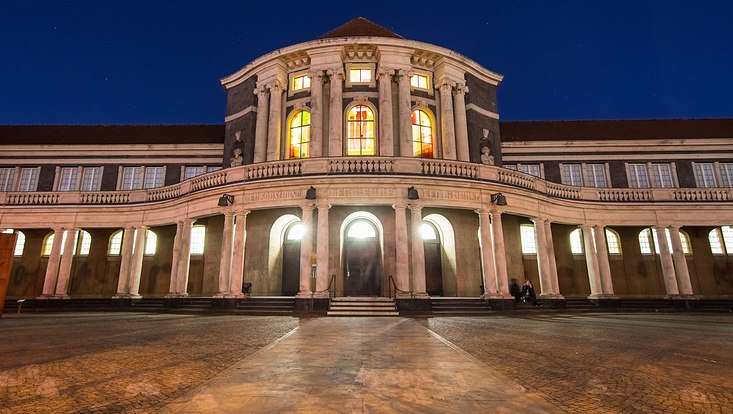15 August 2023
With numerous public eventsEurope’s Biggest Particle Physics Conference at Universität Hamburg

Photo: UHH/Esfandiari
At the European Physical Society’s Conference on High-Energy Physics (EPS HEP 2023), researchers from all over the world gather to share and discuss their most recent findings from a broad range of fields in high-energy physics, including experiments in particle accelerators, the search for dark matter, and previously unknown elementary particles.
“The most important discussion topics in this year include the search for a new, comprehensive physics that brings all previous theories of physics together, as well as an exchange about future, more affordable particle detectors and accelerators, and the technologies they require. We are looking forward to welcoming up to 1000 colleagues to our beautiful city,” says Prof. Dr. Johannes Haller, who is overseeing the conference for Universität Hamburg.
Dr. Haller is also the leading scientist in the Cluster of Excellence Quantum Universe at Universität Hamburg. This research alliance is looking into the origin, development, and compisition of the universe. The research in the Cluster is centered on particle physics, which is why Quantum Universe is sponsoring the conference. With the support of the Cluster of Excellence, the conference this year has emphasized a publicly accessible supporting program, in contrast to the previous conference in 2021 that had to take place in digital form.
- Öffentlicher Vortrag zu den Bausteinen und Kräften der Materie (public talk on the building blocks and interactions of matter) Andreas Höcker from CERN in Geneva will present a general and accessible overview of particle physics and the origin of matter during the time immediately following the Big Bang on 22 August at 8:00pm in the historic main building of Universität Hamburg (Auditorium A). Höcker is the speaker of the ATLAS experiment at CERN.
- Public talk and concert at St. Michael’s Church Wolfgang Hillert, professor at Universität Hamburg, will explain the physics of the organ on 24 August at 8:00pm at St. Michael’s Church. This will be followed by a concert featuring the work of various composers including Johann Sebastian Bach and Felix Mendelssohn Bartholdy.
- Exhibition of particle physics in art From 21 to 27 August, artists who are inspired by particle physics and the questions it explores will present their work in a gallery at Grindelallee 129. The exhibition is open from 3:00pm to 9:00pm daily, except on Sunday (until 7:00pm). The opening will take place on 20 August at 5:00pm. At 7:00pm, art historian Belinda Grace Gardner, Universität Hamburg professor and DESY leading scientist Christian Schwanenberger, and the participating artists Marcel Große, Simone Kessler, Julia Münstermann, and Jana Schumacher will discuss the relationship between art and science.
- Mobile Ausstellung „Urknall Unterwegs" (mobile exhibition big bang on the road) On 21 August, the pop-up participatory exhibition Urknall Unterwegs, will be at Gänsemarkt from 11:00am to 6:00pm, and in the Ernst Cassirer Park behind the historic main building of Universität Hamburg on 22 August from 12:00pm to 8:00pm.
- Exhibition of Ukrainian photographers on threatened science The photography exhibition can be seen during the conference hours at the Audimax of Universität Hamburg, Von Melle Park 4, from 21 August to 25 August.
All events are free of charge and no registration is required.
Prof. Dr. Beate Heinemann, DESY director for the particle physics area emphasizes: “It is an honor for the particle physics section of the European Physical Society to come to Hamburg this year, to discuss the newest scientific findings in this fascinating field. DESY and Universität Hamburg have been worldwide leaders in developing particle and accelerator physics for the last 60 years, and continue to be so.”
The European Physical Society (EPS) is a collaboration between 42 European physics societies. It was founded in 1968 and boasts 100,000 members. The conference for high-energy physics, held every 2 years, is an important exchange format for the researchers who participate. It is held in a different European city each time. Hamburg is hosting the event for the second time in a row, as the last conference was held online due to the COVID-19 pandemic.
Further information on the conference and on the public supporting program is available on the conference pages.
